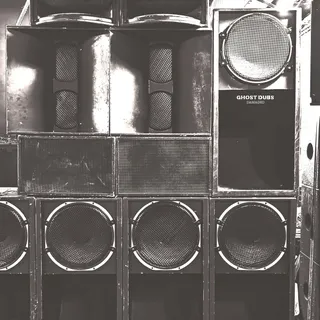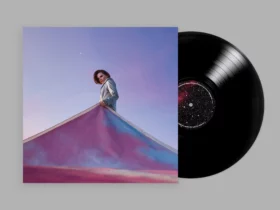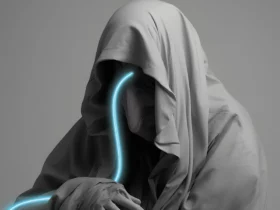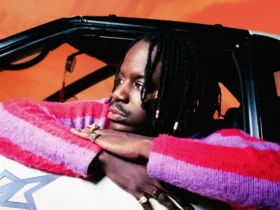GENRE: Electronic
LABEL: Pressure Sounds
REVIEWED: July 24, 2024
The Stuttgart producer Michael Fiedler’s debut album under a new moniker distills ambient dub into a wispy, wraithlike form.
Back in 1994, tasked with curating the fourth volume of Virgin’s ambient series, Kevin Richard Martin coined a new subgenre when he dubbed the compilation Isolationism. Less a hard-and-fast category than a general air of desolation that might crop up in any number of contexts—drone, post-rock, industrial, and more—Isolationism cast a long shadow across subsequent decades of dark ambient. Yet Martin himself didn’t linger there. Though he has made many different types of music under many different aliases over the years, he became most closely identified with the industrial-strength dancehall that he records as the Bug. That range makes Michael Fiedler a natural fit for Martin’s Pressure label. Using aliases like Tokyo Tower and Jah Schulz, the Stuttgart producer has been turning out dub reggae for nearly two decades. But in 2020, Fiedler began putting out a series of drone-driven ambient albums under his own name, tapping into the claustrophobic dread that haunted the original Isolation comp. The two sides of his musical persona now come together on his debut album as Ghost Dubs, a distillation of ambient dub into a wispy, wraithlike form.
Fiedler has been moving toward this sound for a while. On 2020’s Dub Over Science, he slowed his tempos and muffled his bass, luxuriating in the murk. But on Damaged, he takes that process to new extremes. This is dub compressed to the point of abstraction, everything extraneous stripped away. A uniform palette carries across the album: ultra-low sub-bass pressure, hi-hats sanded down to silvery streaks, an omnipresent crackling fizz. Monochrome chords slosh back and forth like water in a bucket; whatever they began as—guitar? keyboard?—now they’re just fleeting smudges smeared across the tape. The bass is remarkable—even at a relatively low volume, it seems to vibrate the walls, turning the room into a larger-than-life speaker cabinet. Yet Ghost Dubs’ sound is also remarkably refined, accentuating the contrast between crystalline details and a swollen low end that wants to devour everything in its path.
This is by no means an original sound—but then, things associated with reggae rarely are. The most obvious antecedent is the music that Basic Channel’s Mark Ernestus and Moritz von Oswald made as Rhythm & Sound, shifting from the club vestiges of their Chain Reaction label—home to ethereal recordings from Porter Ricks, Vainqueur, Vladislav Delay, and Shinichi Atobe—to a more vaporous vision of ambient dub, which gradually abandoned the “techno” half of dub techno. There are also echoes of Deepchord Presents Echospace’s The Coldest Season, a canonical ambient dub album from 2007; Pole’s alternately lilting and lurching studies in throb and crackle; and Andy Stott albums like Passed Me By and We Stay Together, whose air of Sisyphean effort anticipates the trudging uphill gait of Ghost Dubs’ agonizingly slow-motion grooves. Where Ghost Dubs stands out is in the intensity of his productions. Lots of people have tried their hand at this tradition, but few have achieved the heaviness, or the strangeness, of Ghost Dubs’ best work.
In “The Regulator,” a dogged 4/4 behemoth, the chords sound like something dredged up out of the murk. In “Dub Lobotomy,” a metallic loop of tone has been completely severed from its origins; the track’s maze-like acoustics suggest slamming doors, footsteps on cement, heavy objects being dragged downstairs. Vocals, when they appear, are no more than disembodied sighs. Some of the most captivating tracks are the most disorienting: “Second Thoughts” is little more than a fistful of coppery chords held up against a backdrop of substation hum, the kick drum stumbling and irregular, the form barely even recognizable as dub.
Not everything here is as memorable; in a genre like ambient dub, where there are few chords at the producer’s disposal, it all comes down to the novelty of the detailing. Over the course of the album’s 48-minute run, tracks invariably blur together. But given the hypnotic aspect of Ghost Dubs’ sound, I suspect that’s partly the point. And in any case, every so often a chord rings out in a way that sounds completely new. For me, it happened with “Dub Simulation,” the album’s penultimate track; outwardly, it barely differs from its companions, yet there’s something about the chord’s heft and proportions, at once pillowy and leaden, that immediately stood out. On tracks like that one, Ghost Dubs’ project feels like a formal experiment and a philosophical argument. The popular imagination frequently conflates reggae with sunshine and repose—prelapsarian idyll as stoned fantasy. But what if it were really the soundtrack to darkness, struggle, and enervation? That’s the sound of Damaged, channeling the friction between sensuous pleasure and strenuous physical effort into a virtual boulder of a sound—massive, smooth to the touch, and stubbornly unyielding.





